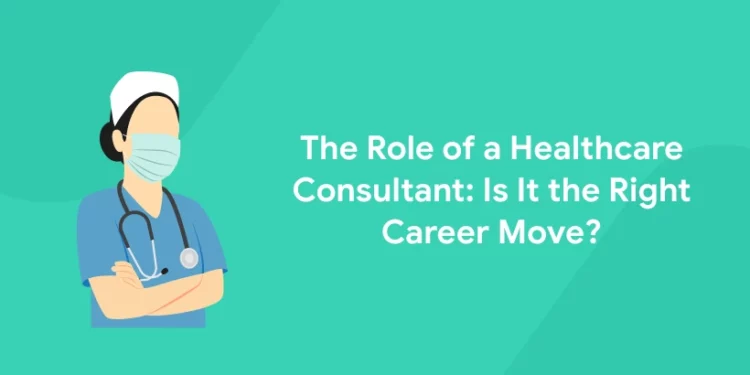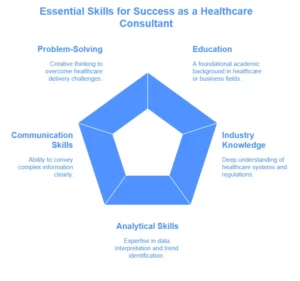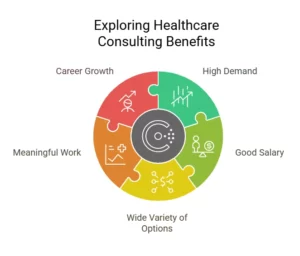With the dynamic and profound interventions in the healthcare industry, the role of a healthcare consultant has become increasingly vital. Healthcare consulting mines deep into business strategy, healthcare knowledge, and problem-solving capability. The ever-changing realm of healthcare generates great demands for skilled consultants who maneuver through contradictory challenges to improve organizational performance. But is this right for your career? The present guide discusses some of the crucial insights—essentially, what is a healthcare consultant, the responsibilities and skills, qualifications required, and career outlook—for your assistance in making a decision.
Join Entri’s Hospital and Healthcare Administrator Course
What Does a Healthcare Consultant Do?
Healthcare Consultants/specialists are experts who offer professional recommendation to healthcare organizations, inclusive of hospitals, clinics, coverage companies, pharmaceutical firms, and authorities agencies. Their number one aim is to enhance efficiency, lessen costs, beautify affected person care, and make certain compliance with regulations. Key duties include:
- Analyzing statistics to discover operational inefficiencies.
- Developing techniques to enhance healthcare delivery.
- Advising on regulatory compliance and healthcare policies.
- Implementing new technology or systems.
- Conducting economic analyses and budgeting.
- Providing schooling and aid to healthcare staff.
Key Responsibilities of a Healthcare Consultant
Healthcare consultant paintings with numerous corporations, inclusive of hospitals, clinics, coverage companies, pharmaceutical firms, and authorities agencies. Their number one intention is to assist those corporations function extra efficiently, lessen costs, and enhance affected person care. Key duties include:
- Data Analysis: Identifying trends, inefficiencies, and possibilities for development via facts analysis.
- Strategic Planning: Developing and imposing techniques to decorate healthcare transport and organizational performance.
- Regulatory Compliance: Ensuring corporations adhere to healthcare laws, regulations, and standards.
- Technology Implementation: Advising on and dealing with the adoption of latest healthcare technology or systems.
- Financial Management: Conducting fee analyses, budgeting, and monetary planning.
- Training and Support: Providing steering and schooling to healthcare team of workers to make sure a success implementation of latest approaches or systems.
Skills and Qualifications Needed
To be successful as a healthcare consultant, you`ll want a aggregate of technical expertise, analytical skills, and interpersonal abilities:
- Education: A bachelor`s diploma in healthcare administration, business, public health, or a associated discipline is generally required. Many experts additionally preserve superior degrees (e.g., MBA, MHA, or MPH).
- Industry Knowledge: A robust information of healthcare systems, regulations, and developments is essential.
- Analytical Skills: Ability to interpret data, pick out developments, and expand data-pushed solutions.
- Communication Skills: Must be capable of gift complicated data certainly to various stakeholders.
- Problem-Solving: Creative wondering to cope with demanding situations in healthcare delivery.
- Project Management: Ability to control more than one initiatives and meet deadlines.
Join Entri’s Hospital and Healthcare Administrator Course
Educational Qualifications and Certifications
While the specific requirements may vary, most healthcare consultants have the following qualifications:
- Bachelor’s Degree: In healthcare administration, business, public health, or a related field.
- Advanced Degrees: Many consultants hold a Master of Business Administration (MBA), Master of Healthcare Administration (MHA), or Master of Public Health (MPH).
- Certifications: Earning certifications can enhance your credibility and expertise. Examples include:
- Certified Healthcare Consultant (CHC)
- Project Management Professional (PMP)
- Certified Professional in Healthcare Quality (CPHQ)
- Experience: Prior work experience in healthcare administration, finance, or operations is highly valued.
Benefits of a Career in Healthcare Consulting
- High Demand: The healthcare industry is witnessing rapid growth, consequently creating a huge demand for consultants.
- Good Salary: Healthcare consultants are well compensated, with salaries generally from 80,000 to 150,000+ depending on experience and geography.
- Wide Variety of Options: They can choose from a variety of sectors, including hospitals, pharmaceuticals, insurance, and public health.
- Meaningful Work: You will be able to change healthcare systems and improve patient outcomes.
- Career Growth: Consulting brings opportunities for growth, specialization, and leadership.
Challenges of Healthcare Consulting
- Intense Pressure: deadlines for important projects tempt people into pressure-filled situations.
- Extended Work Hours: Consulting within business does compel long hours; this happens proportionately as a function of time when deadlines are approached.
- Ongoing Learning: The fast-paced and continuously evolving healthcare industry has made it necessary to keep abreast with the developments concerning policies, technologies, and trends.
- Travel Requirements: Depending on your company, you might need to travel quite often to see clients.
How to Get Started
- Gain Relevant Experience: Essential to gaining appropriate exposure will be working in healthcare administration, finance, or operations to know the industry better.
- Pursue Education: Having formal advanced degrees or certifications such as a Certified Healthcare Consultant or Project Management Professional will be advantageous.
- Networking: One should connect with professionals who work in the field at industry events, LinkedIn, or professional organizations, such as the Healthcare Consultants Association.
- Consider Entering Consulting Firms: From there, the applicant could proceed to entry-level bids for consulting firms or healthcare organizations.
Join Entri’s Hospital and Healthcare Administrator Course
Conclusion
Becoming a health care professional consultant has much effort but a satisfying journey. It could affect the current health care systems in exchange for attractive wage benefits and varied career tracks. The undertaking would ordinarily require one to have very superior analytical thinking, be most excellent in communication, and invest in continuous learning. You may want to look more into the options as a career choice if you are very interested in oligopoly problems and improving the delivery of health care.
Hospital Administration Course with Assured Career Growth
Hospital Administration Course by Entri App: Master essential healthcare management skills, gain certification, and secure top roles in leading hospitals
Join Now!Frequently Asked Questions
1. What does a healthcare consultant do?
Ans: Healthcare consultants analyze data, develop strategies, and provide advice to healthcare organizations to improve efficiency, reduce costs, and enhance patient care.
2. What qualifications do I need to become a healthcare consultant?
Ans: A bachelor’s degree in healthcare administration, business, or a related field is typically required. Advanced degrees (e.g., MBA, MHA) and certifications (e.g., CHC, PMP) can enhance your prospects.
3. Is healthcare consulting a lucrative career?
Ans: Yes, healthcare consultants are well-compensated, with salaries ranging from 70 , 000 t o 70,000to150,000+ depending on experience and location.
4. What skills are essential for a healthcare consultant?
Ans: Key skills include analytical thinking, communication, problem-solving, project management, and industry knowledge.
5. What are the challenges of being a healthcare consultant?
Ans: Challenges include high-pressure environments, long hours, frequent travel, and the need to stay updated on industry trends and regulations.














